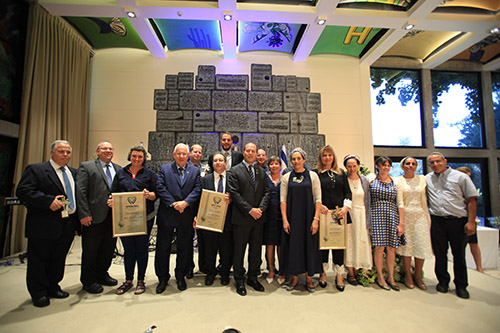



Jerusalem—This past Thursday, over two million people around the world participated in the third annual Unity Day, celebrating the amazing unity that came about during the difficult weeks while awaiting news of missing Naftali Frankel, Gilad Shaer and Eyal Yifrach in the summer of 2014. In Jerusalem, the Jerusalem Unity Prize was awarded by President Reuven Rivlin to four deserving candidates. In the National category, the winner was Tzav Piyus, an organization dedicated to improving the lives of young Israelis.
It’s not difficult to imagine why Tzav Piyus would win a unity prize—one’s first thought when hearing about their tremendous projects is achdut. Whether through schools, camps, Israeli football or other extracurricular activities, Tzav Piyus aims to create casual contexts for younger Israelis of different backgrounds to meet, where they can better feel what they have in common and focus less on their differences.
“We’ve found that friction and negative feelings for people who are different come from separation,” said Ra’anan Hirsch, partnerships development director at Tzav Piyus. “As a society, our best hope is to start trying to understand one another in order to improve the internal unity among the different populations here.”
Hirsch, who worked in sales and business development in the Israeli high-tech scene for over 20 years, was inspired to become involved in Tzav Piyus after visiting his in-laws in the United Kingdom and seeing the unity and cooperation in their community between religious and nonreligious Jews. Inspired by the achdut in Britain, Ra’anan wanted to become involved in actualizing this vision in Israel and soon found his way to Tzav Piyus, where he helps implement this ahavat chinam on a daily basis.
Aside from the communal extracurricular activities, Tzav Piyus has been working in recent years to innovate integrated schools and ganim (preschools) in order to allow for Jews of all backgrounds to receive a traditional Jewish education and be exposed to their brethren from different sects at a young age. Leading this project is native of Israel’s Gush Dan, Assaf Hirshfeld.
Hirshfeld, who heads Tzav Piyus’s formal education division, relates to the need for integrated Jewish education on a very personal level. Assaf, a religious Jew, married Michal, a secular Jew, and realized soon on that finding an education system that would satisfy both of their requirements would be very difficult. Twelve years ago, the Hirshfelds helped found the Keshet school in their community of Mazkeret Batya, a school that has many religious and secular students and aims to provide a superb education while giving the children an opportunity to develop bonds without feeling the social barriers of their different backgrounds.
Building off of the success of the Keshet Mazkeret Batya project, Hirshfeld has helped Tzav Piyus excel at integrating Jewish education, and he now heads a 15-person committee that advises many private and public schools in their social integration.
“Our work has a noticeable influence on both children and parents,” said Hirshfeld. “We teach the children to live with people who think differently than they do and that they can learn from people with different perspectives from them—that we all have a lot in common.”
“The beauty of our schools and programs is that we see that the children are able to become more open-minded without losing their religious identity,” said Ra’anan Hirsch. Hirsch’s 12-year-old son, who is himself a participant in many Tzav Piyus events, has made many good friends who are religious, secular and even some left-wing kibbutznikim. He stays in touch with them throughout the year and is even looking forward to having them join in his bar mitzva in El’azar this summer. “We’ve found that, recently, his religious identity has become even stronger,” said Hirsch. “We grow stronger in ourselves by recognizing and respecting our differences with others.”
“Our goal at Tzav Piyus is to cement the joint Israeli-Jewish vision,” concluded Hirshfeld, “to allow everyone to keep their individuality yet also build achdut with others who are different.”
Thanks to Tzav Piyus’s joint schools, “Hamachane Hameshutaf” teen summer camps, Israeli football league and other activities, thousands of Israeli youth are being exposed to unity at a young age, developing true ahavat chinam.
Calling upon Jews around the world to continue celebrating achdut, Racheli Frankel, mother of Naftali, said, “I don’t need the world to remember my son Naftali—that will be the job of his family and friends. But what I do want is for the world to remember how the global community behaved during those 18 days of uncertainty and to always remember the power we have as a people when we choose unity over division.”













